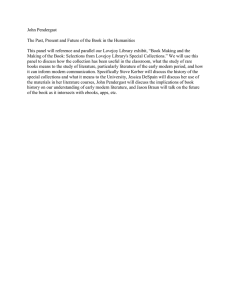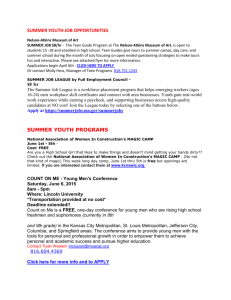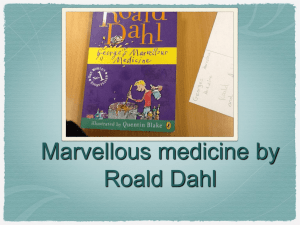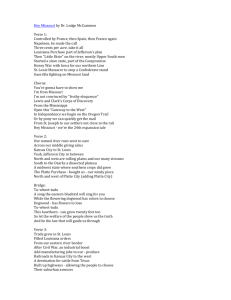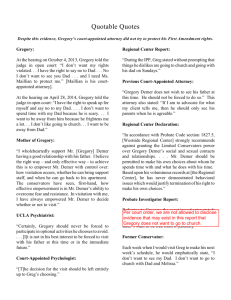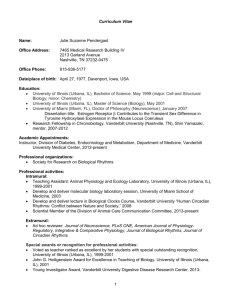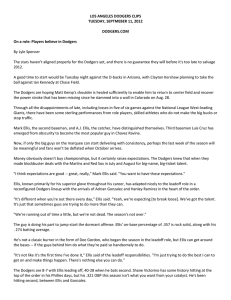Grandma Gregory and the Pendergast Machine
advertisement
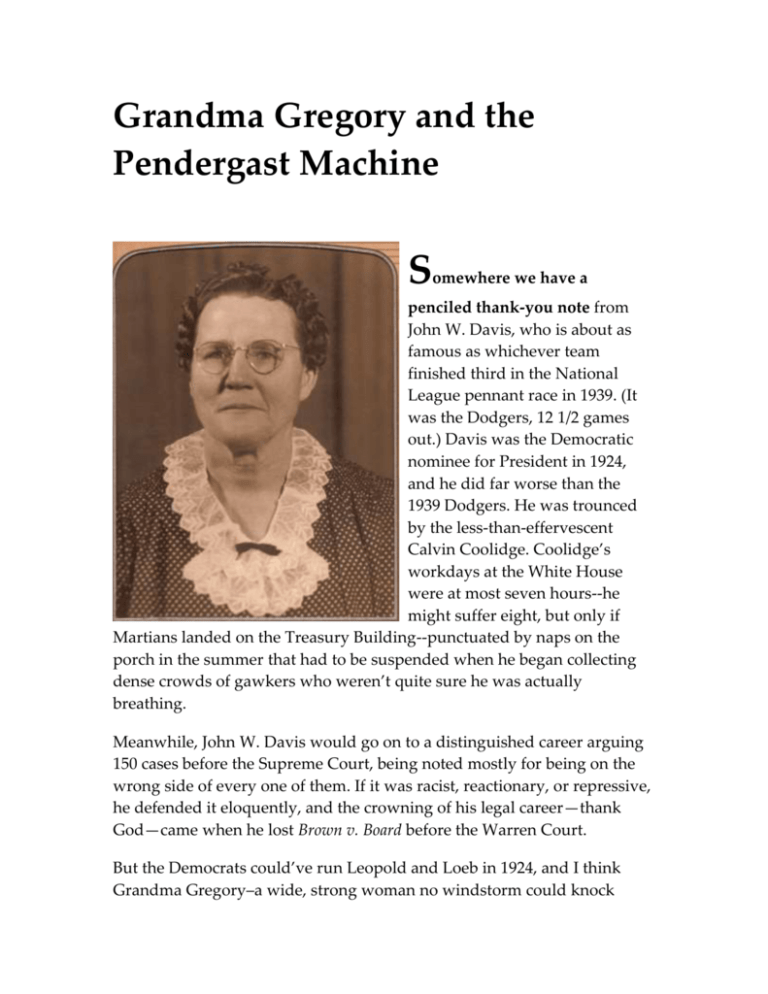
Grandma Gregory and the Pendergast Machine Somewhere we have a penciled thank-you note from John W. Davis, who is about as famous as whichever team finished third in the National League pennant race in 1939. (It was the Dodgers, 12 1/2 games out.) Davis was the Democratic nominee for President in 1924, and he did far worse than the 1939 Dodgers. He was trounced by the less-than-effervescent Calvin Coolidge. Coolidge’s workdays at the White House were at most seven hours--he might suffer eight, but only if Martians landed on the Treasury Building--punctuated by naps on the porch in the summer that had to be suspended when he began collecting dense crowds of gawkers who weren’t quite sure he was actually breathing. Meanwhile, John W. Davis would go on to a distinguished career arguing 150 cases before the Supreme Court, being noted mostly for being on the wrong side of every one of them. If it was racist, reactionary, or repressive, he defended it eloquently, and the crowning of his legal career—thank God—came when he lost Brown v. Board before the Warren Court. But the Democrats could’ve run Leopold and Loeb in 1924, and I think Grandma Gregory–a wide, strong woman no windstorm could knock down– would’ve worked her heart out for them as long as they were Democrats. She was a delegate to the convention that year, and this, only four years after women got the vote, when she was elected the Texas County, Missouri, Party Chairwoman. Eventually she became a formidable power broker throughout the Ozark foothills. Before every election, my Dad remembered, a new car would pull up outside my Grandfather’s farmhouse and two men in three-piece suits (usually reserved for funerals, and even then for the Deceased) would deposit a bank bag full of cash on one more stop on a kind of purgatory circuit–you had have a real passion for soybean fields to make the drive enjoyable–through the Missouri hinterlands. They were bagmen for the Kansas City Pendergast Machine, one of those old-timey operations that really did practice the kind of voter fraud that terrifies the right wing today, because the fact that it’s so uncommon makes it so obvious to them that voter fraud is actually as common as dinner peas, and the mainstream media is covering it up. They did the same thing when they covered up Communist fluoridation of our drinking water. Jim Pendergast had laid the foundation for the family at the turn of the century; as an alderman, he’d proved adept at mobilizing the Irish vote, and the Kansas City Irish voted enthusiastically if not alphabetically, like the Texas border town that helped Lyndon Johnson whip Coke Stevenson by 47 votes (hence, "Landslide Lyndon") in their U.S. Senate race. Jim’s first personal mayor was named Reed and Jim’s little brother, Tom, at right, found his vocation as Superintendent of Streets, and the brothers prospered. Eventually, Tom would become to Kansas City what Lorenzo de Medici was to Florence, but he grew bootleggers, gamblers, and whores in place of the artists Lorenzo cultivated in his sculpture garden. Both men went to Mass regularly, and with immense serenity. And Tom Pendergast had Texas County in the bag, so to speak, because, in the deepest Depression, my pre-teen Dad handed out fives from that bank bag left on the kitchen table to waiting voters, murmuring, “The Democratic Party thanks you,” over and over, like a priest at Eucharist, so the Democrats never lost Texas County. Ever. Pendergast also saved desperately poor people from starvation, for rural America’s Depression had begun years before Wall Street’s, and would bottom in depths unknown to the Dow. But My Dad helped distribute food, too, and. discovered that grapefruit puzzled Hill people. Neither boiling nor frying improved their opinion of grapefruit, and it was the only time they balked at Tom’s largesse, for they knew he enjoyed the power their votes gave him, but they knew, too, that he cared about them. Henry Ford didn’t. Herbert Hoover and Douglas MacArthur didn’t. A Kansas City Irish Catholic who wore cuff links and silk ties would not let the Ozark Hardshell Baptists in his care go hungry. To him, that was an insult, in his country, America, and on his turf, one-half of the state of Missouri, and so the man who could buy county judges in bunches spent much of his hard-earned graft on food. Pendergast also made the career of a county judge named Harry Truman (both of them pictured at left) possible, which indirectly made me possible: Truman favored my grandfather’s blackberry wine on campaign swings downstate, and that little sideline of Grandpa Gregory’s--he also developed a passion for ginseng, which grew right alongside his tobacco and corn-- paid off in World War II. Senator Truman got my father appointed to Officers’ Candidate School as a Quartermaster, which saved me the inconvenience of having Dad vaporized by a German 88 shell before I had the chance to be born. I wish I could say I loved my Grandmother, but she was a steel-spined schoolmarm who didn’t tolerate foolishness, by which she meant Consciousness, Breathing, and Moving, and she used to whack us absently with her cane. We stole her eyeglasses in revenge. And, sadly, by the time I knew her, she was edging into dementia, and though she couldn’t locate her dentures, she could remember, in vivid detail–you could almost smell charred flesh and sick-room alcohol–how every person in southern Missouri had died between the War Between the States and the 1939 Dodgers. It didn’t take a lot to prompt a Grandma Gregory Death Story. But, as a younger woman, she was shrewd, forceful, and I think had the same instinct, in a political sense, that leads orcas to crippled seals. I would not mess with that woman. And for that, for her steel, I admire her immensely.
